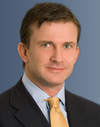Archive » 2009 » Issue 67 (February)
A little innovation can reap rewards
01 February, 2009
A number of new funds are starting to find their way onto the market and are attracting inflows but putting the client first is paramount
|
Clients run scared of hedge funds
01 February, 2009
Clients should be encouraged to take on limited risk in order to achieve moderate returns, reports Elisa Trovato
|
Attending to the client experience
01 February, 2009
Wealth managers now understand the volume wealth market better and are uncovering big opportunities, writes Sebastian Dovey
|
Successfully blending two cultures
01 February, 2009
Yuri Bender talks to Alfredo Piacentini, co-founder of Banque Syz & Co, about his determination to improve performance in private banking
|
DEKA funds business heads back to basics
01 February, 2009
Oliver Behrens believes that harsh economic conditions are forcing the German mutual funds industry to take a safety first approach, and that DekaBank remains one step ahead of the competition in adapting to the new climate, writes Yuri Bender
|

|
Juerg Zeltner |
To centralise or segregate?
01 February, 2009
The multi-boutique model and the more integrated approach to structuring fund houses and wealth managers both have their supporters but which, asks Yuri Bender, is more suited to the current financial landscape?
|

|
James Bevan |
Is it time for a fresh start?
01 February, 2009
They may have recieved a bad press recently but some believe that structured products have been unfairly lumped in with other failing investment vehicles and that they can still offer solutions to complex problems, writes Nat Mankelow
|

|
Emmanuel Naïm |
Staying in tune with clients’ requirements
01 February, 2009
Emmanuel Naïm explains how innovation need not mean complexity, and how a number of simple structured products are designed to cater to clients’ needs, protecting their capital while taking advantage of any recovery in the equity markets
|

|
Christopher Taylor |
À la carte fine dining or ‘Big Macs’?
01 February, 2009
Christopher Taylor explains the need to differentiate between ‘structured products’, which can just be sales and marketing driven, and ‘structured investments’, developed by research-backed investment thinking
|
Using emerging economies to beat the crunch
01 February, 2009
Emerging markets may not be immune from the global economic downturn but they could recover faster than western markets. Investors looking for positive returns are shying away from exotic markets and looking to manage risk in areas such as local currency debt and eastern European economies, writes Ceri Jones
|
Claudio Barberis
01 February, 2009
“The portfolio for January remains nearly unchanged from the previous month. We sold some AXA Euro 7-10 bond and bought the more diversified BlackRock Euro Bond fund. The overall portfolio remains conservative, with exposure to gold and high dividend stocks. We maintain the corporate bond exposure through the UBS and Schroder funds, because we think that 2009 will be a stronger year for corporate bonds due to central bank policy interventions.”
|
Christian Jost
01 February, 2009
“During 2008, international stock markets were forced to undergo a thorough period of consolidation. The main reason for the difficult market environment is the cooling down of the global economy and the heavy need for write-downs particularly in the banking and insurance sector. Starting with the new year of 2009, we will allocate the PWM portfolio according to C-QUADRAT Best Fonds Strategy, which invests in five of the most promising and lowly-correlated asset classes (equities, real estate, commodities, bonds and hedge funds) and creates therefore an ideal risk-return profile.”
|
Graham Duce
01 February, 2009
“We believe that the credit markets offer stronger risk-adjusted returns for 2009 than equities. Last year, within the bond space, we witnessed a strong flight to quality as investors shunned higher risk bonds for the safe haven of government debt. We now believe that government debt is expensive, while investment grade credit offers investors value relative to both government debt and equities. One lesson from the last 12 months is cheap assets can get cheaper. The Bluebay fund offers investors a flexible corporate bond fund that has both the remit and team to benefit from volatile market conditions.” We have increased the portfolio allocation to this asset class via Blue Bay Investment Grade, while reducing Thames River Global Bond. However we have done this in a managed approach leaving us some more firepower to add to the position later on.
|
Steffan Selbach
01 February, 2009
“We have reduced the equity quote from 30 per cent to 25 per cent. We believe that the current earnings forecasts for 2009 are still too high. We have reduced exposure to the US, Europe, Japan and Emerging Markets. In the last months our biggest challenge - next to the development of the equity markets - was the exposure in the bonds border areas such as the emerging markets and high yield bonds. We would not have expected a diversified corporate fund to lose 40 per cent. But we are confident that these assets will pay us back some of the losses in 2009. The spreads against Goverment-Bonds are very attractive.”
|
Alessandro Costa
01 February, 2009
“During the last month we reviewed our entire portfolio. We replaced DWS Global Value, Gartmore Emerging Markets Equities, UOB Kinetics Paradigm, Mellon Global Bond and Long Term Investment Classic with Vontobel US Value, Templeton Mutual Discovery, Generali Euro Bond and UBS US Growth. All the changes follow the decision to reduce the tracking error of the portfolio. We removed the bets on emerging markets and on global bond asset classes and we increased the weight of defensive funds.”
|
Julien Moutier
01 February, 2009
“The market slide levelled out somewhat in December, which allowed volatility to ease from the extreme levels reached in October and November. As a result, returns on our portfolio were slightly negative, as we were penalised by the correction on European equity markets. Fortunately Asian Equities, and particularly Euro fixed income investments, supported our performance. Uniglobal Minimum Variance and Franklin Mutual Beacon were, once again, particularly resilient to falling markets. We increased our position on European and Asian equities, which should benefit if the market bounces back.” These purchases were financed by sales of Ecofi Quant Trésorerie Dynamique which aims to outperform the cash index.”
|
Georges Wolff
01 February, 2009
“The New Year brought several changes in the portfolio driven both by tactical decision and fund specific factors. Focusing on the fixed income, we have maintained our position in convertible bonds but we have also taken an exposure to high yield bonds in order to play spread tightening. We have made a few changes on the equity side. UBAM Neuberger Berman US Eq Value has been added to the portfolio, as the recent underperformance of the fund has led to an entry point. We have also replaced Grande Europe with funds focusing on Core European countries.”
|
Peter Fitzgerald
01 February, 2009
“We bought back into the Invesco Perpetual High Income Fund. We sold this fund in 2008 given our concerns for both Sterling and the UK economy. Following the fall of sterling against the euro, we believe this fund now offers value. The best return in December was from Odey Pan European. This was followed by the US equity managers who also delivered positive returns. The IdB Real Estate Long Short fund also managed a positive return. One of the poorest returns was from the Invesco Perpetual High Income fund, due to the currency issues. It was at this point that we invested.”
|
Bernard Aybran
01 February, 2009
“Most existing holdings fared fairly well in December, with one major exception: Magellan lagged its benchmark by a large extend, which trimmed somewhat its still impressive outperformance. The alternative part of the portfolio has been switched in order to keep the most liquid and transparent type of assets: a tactical asset allocation fund, with daily in and out liquidity and no notice. Besides, we added a pure OECD government-bond money market fund instead of a regular one, in order to stay away from any further turbulence in the interbank market. The asset allocation remained broadly unchanged.”
|
Alex Borer
01 February, 2009
“Our conservative tactical investment strategy recommended in November 2008 proved to be favourable. After the short-term capitulation move of the equity markets in late November we expect a base building process. Valuation is compelling, sentiment extremely negative. Accordingly, we increased the equity allocation by 9 per cent to 43 per cent (Asia + 4 per cent, US + 2 per cent, Emerging Markets + 2 per cent, Europe + 1 per cent). On the other hand, we reduced the government bond allocation after a very strong run of 4 per cent. We exchanged SVG Capital for the iShares ETF on listed private equity and sold Reichmuth Matterhorn hedge fund of fund (5 per cent).”
|
David Bulteel
01 February, 2009
“We have decided to make several changes in the portfolio. We switched Artemis European into a mixture of Gartmore Cont. Europe and Schroder European Alpha Plus. We have been concerned for sometime that the Artemis quant driven process for Europe as been slightly hamstrung by sentiment driven markets. We have pulled out of European Asset Value which is a property securities fund and switched the small-cap orientated Atlantis Japan into the more broadly based Polar Cap Japan fund which has delivered returns recently. With the residual cash we topped up the Findlay Park American Smaller Cos. Fund.”
|
Gary Potter and Rob Burdett
01 February, 2009
“The strength of the Euro had a big impact on returns in December, meaning that although overall fund selections did well within their peer groups only two funds generated positive returns - Thames River Global Bond which benefited from sharply falling global interest rates and a continued flight to quality, and IVI European which bucked the trend for European funds. Going into 2009 we are positioned for a year where micro factors increase in importance now that the macro conditions are widely known. At points during the year recovery will be anticipated but some of these rallies will undoubtedly prove to be false.”
|
Panel investment
01 February, 2009
Each month in PWM, 12 top European asset allocators reveal how they would spend €100,000 in a fund supermarket for a fairly conservative client with a balanced strategy
|

|
Schmidt: steered clients clear |
INSTITUTIONS failed to ask right questions
01 February, 2009
Many people had a sense that something was not quite right with Bernard Madoff's investments, writes Martin Steward, but chose to ignore the signs
|

|
Josée Denis,
BNY Mellon Asset Servicing |
Global outlook expands role of transfer agents
01 February, 2009
The Ucits directive has given European investment funds an increasingly global reach, which in turn has increased the responsibilities of transfer agents. But adapting in order to provide these new services brings a number of challenges, writes Rekha Menon
|